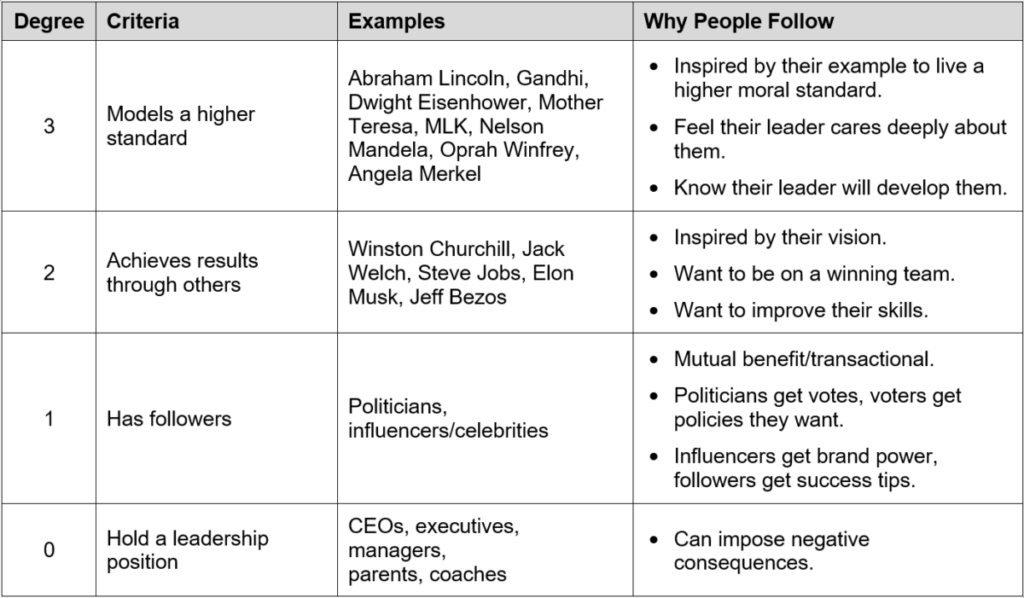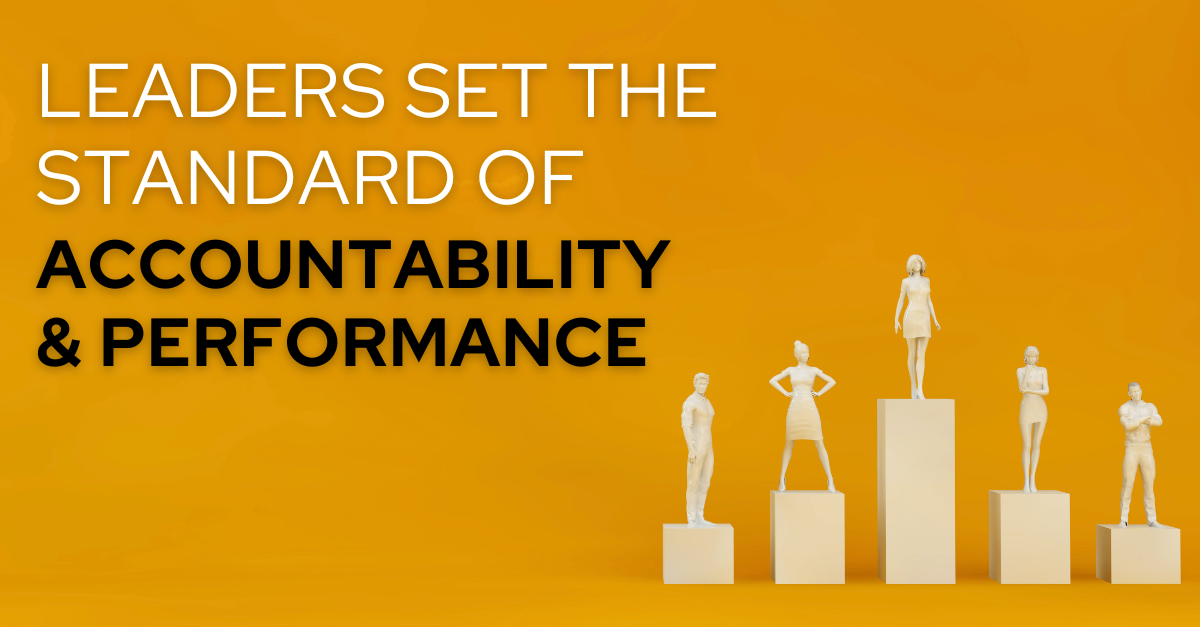What’s the difference between a good leader and a great one?
Steve Jobs is one of the most celebrated and admired leaders of all time. Apple, the company he co-founded, substantially changed our world. He revolutionized several industries, including personal computing, animated movies, music, and cell phones. His story is legendary. He was kicked out of the company he cofounded and then returned 12 years later to save it from bankruptcy and turn it into the most valuable company in the world. Jobs was described as a brilliant, autocratic perfectionist who was tough on people.
When his biographer asked him about his tendency to be rough on his people, Jobs responded, “These are all smart people I work with, and any of them could get a top job at another place if they were truly feeling brutalized. But they don’t.”
Having willing followers is evidence of leadership, but does that, and producing great results, qualify one as a great leader? Exactly what does qualify someone as a leader? This is an important question to answer, for, without a clear standard for leadership, we’ll continue promoting and rewarding people who don’t deserve it and overlook those who could really make a difference.
Different Standards of Leadership
I have observed three levels, or degrees, of leadership, and one counterfeit. Each degree has its own criteria.
Degree Zero – Holds a Leadership Position
CEOs and other senior managers are often referred to as “leaders.” However, simply holding a leadership position does not make one a leader. This common misuse of the word has led many people with impressive titles to believe that others should obey them simply because of their position. Similarly, those in positions of authority tend to believe they don’t need to learn how to be an effective leader because, in their eyes, they’ve already met the criteria.
Holding a leadership position is a counterfeit standard of leadership. The reason people do what those in authority want them to do is because they fear the consequences of not doing so.
First Degree – Has Followers
The minimum standard of leadership is to have followers—people who willingly comply with your requests. Some celebrities, influencers, and politicians meet this minimum standard. People who follow influencers get free success tips, and influencers get more brand power. Likewise, voters hope to get the policies they want, and the politicians they vote for get elected.
Simply having followers may make you a leader of sorts, but it’s just scratching the surface of leadership. It’s transactional. Quid pro quo. Followers may admire and respect first-degree leaders, but they are not accomplishing anything together. People follow first-degree leaders primarily for what they hope to get.
Second-degree – Achieves Results Through Others
Most celebrity CEOs are second-degree leaders. Despite their personal shortcomings, many people willingly followed and admired Jack Welch and Steve Jobs in their day, and others follow and admire Elon Musk and Jeff Bezos today. Second-degree leaders inspire followers by their vision of a better future. People follow them because they want to be on a winning team.
Following a second-degree leader requires commitment and sacrifice. Elon Musk expects his employees to work “long hours at high intensity.” Jeff Bezos stated “It’s not easy to work here, but we are working to build something important . . .”
Followers must get in the game and contribute their energy to accomplish their leader’s vision. They’re happy to work hard for their leader’s vision because they believe in it, and they know they’ll gain experience and skills that they can’t get anywhere else.
Followers of second-degree leaders don’t have any illusions about where they sit on their leader’s priority list. If their performance dips for any reason, they know they’re gone. But they are willing to make that trade-off to be part of something bigger than themselves.
Third-degree – Models a Higher Standard
Truly great leaders elevate the behavior of their followers while they accomplish a worthy goal.
How do they do this? By striving to live a higher moral standard themselves.
Bob Chapman, chairman and CEO of Barry-Wehmiller, turned a struggling manufacturing company into a $3.5 billion juggernaut that outperformed the S&P 500 by almost 400 percent over sixteen years. However, his focus shifted from profits to people after he had an epiphany that every one of his employees was someone’s precious son or daughter. He calls his leadership approach “Truly Human Leadership” where ensuring team members feel valued and cared for is a top priority.
The 2008 economic downturn hit Barry-Wehmiller hard. The standard business response is layoffs. Instead, Chapman proposed a furlough program where everyone would take a month off without pay. He explained that “It’s better that we should all suffer a little than any of us should suffer a lot.” His gesture of caring for others caught on. Some employees who could afford it offered to take six weeks unpaid leave for those who could only afford two weeks.
Second-degree leaders inspire followers to work hard to improve the world, but third-degree leaders inspire followers to improve themselves while they work hard to improve the world.
Second-degree leadership is focused on improving things. Third-degree leadership is focused on transforming lives.
Great Leaders Model a Higher Standard
Angela Merkel is often credited with being the steady hand that guided the EU through more than a decade of crisis, including the 2009 euro debt crisis, the 2015 migrant crisis, and the COVID-19 pandemic. She is known for her calm, analytical response to problems. She seeks cooperation over confrontation and finds common ground with opponents to win allies.
When widely criticized for her decision to let a million refugees into Germany, many of Muslim origin, she responded, “The necessary and decisive battle against terrorism does not in any way justify putting groups of certain people under general suspicion, in this case people of Muslim belief or of a certain origin.”
It’s been said of Merkel that “she seems to have no vanity. She doesn’t need to win every argument. She doesn’t have to get in the last word. She quietly assesses the different factors involved in a given situation and then decides which way she wants to go, and does it quietly and without fanfare.” A diplomat observed that it’s remarkable for a politician to put other people’s interests before their own, but that’s precisely what makes Merkel stand out and why she earned the trust and respect of other world leaders.
Second-degree leaders care more about achieving their goals than about the people they lead. Third-degree leaders care deeply about achieving their goals too, and elevating the people they lead is always a central part of their vision.
For instance, second-degree leaders abandon or fire team members whose performance dips. Third-degree leaders find temporary workarounds and invest extra attention to support their team members to overcome performance challenges. This may require leaders to own the consequences of short-term setbacks, but it often produces greater long-term commitment and success when the team member overcomes their challenge.
The employee of a client who is a third-degree leader told me that early in her career, dealing with her father’s substance abuse problems affected her work performance. After a particularly bad week of dealing with her dad’s issues, she realized she had dropped the ball on an important project. She walked into her manager’s office and told him that she had screwed up. He told her to go ahead and look after her father and not worry about her project; he would take care of it. Moments later, she learned that her father had just committed suicide. Although company policy provided for one week of paid bereavement leave, the firm gave her two weeks.
She was blown away by how understanding her manager was, especially since she had put him in a difficult situation. From then on, she was totally committed to her manager and her company. She’s been with the firm for sixteen years.
Summary of the Degrees of Leadership

Become a Great Person to Become a Great Leader
Although most of the examples above are of famous leaders, anyone can become a third-degree leader. Great leadership boils down to making a few commitments.
- Accomplish Big Goals Through Others. A general once remarked to Dwight D. Eisenhower that it must take guts to delegate. Eisenhower responded by quoting a nineteenth-century German general who said, “Centralization is the refuge of fear.” Giving others the opportunity to try new things and supporting them to make decisions is how you build their capacity, and yours, to accomplish big goals.
- Care For and Elevate Those You Lead. Oprah Winfrey is famous for her demonstrations of generosity to her viewers, her team members, and the community. The monetary value of what she gives is a token of what she is really giving—love. A former employee said of Oprah, “You always felt that your hard work was in direct proportion to the accolades that you would get at the end of the day.”
- Strive to Live a Higher Moral Standard. You don’t have to be Gandhi to be a great leader; you simply must be willing to sacrifice your ego and subjugate your impulses for the good of others. This includes things like resisting the urge to blame others when things go wrong, acknowledging your part in problems, accepting critical feedback with gratitude, and addressing potential conflicts directly and with an open mind instead of firing off a fiery email. You must discipline yourself to model the behavior you want to see in others.
Truly great leaders are first concerned with becoming a great person. We can all become great people and truly great leaders. As Stephen Covey taught, the process is inside out. Be the change you want to see in others, and they will follow you anywhere.






7 Responses
Well put!
I will add that caring about people without caring just as much about results is actually missing something important. Not just for the business, but for the people. This is the difference between being a great place for people to work and being a great place for great people to work.
Your choice and description of Bob Chapman as a third degree leader implies that results really matter, and my hope is that stating it explicitly sharpens our collective understanding of great leadership.
To excellence!
Good point Dan. I made a small edit to the following sentence based on your feedback:
“Second-degree leaders care more about achieving their goals than about the people they lead. Third-degree leaders care deeply about achieving their goals too, and elevating the people they lead is always a central part of their vision.”
This is an outstanding article. Probable one of the best if not the best you have published Since you have categorized most people as leaders, including parents, the range of individuals it is applicable to is immense. Looking forward to your Ted talk.
Thanks John! I always appreciate your support!
I love this Michael! I strive to be a leader to the 3rd degree. All of the people you listed are my heroes. Thank you for so clearly teaching the difference.
Thanks Diane! I really appreciate your comments! Thanks very much. I’m so glad you enjoyed the article.
Michael … I got to the article late, but enjoyed it very much. I would note how leadership is an iterative process and your 3 Degrees illustrates just that … those of us with more time in leadership can recall the challenges we faced early on, in some cases not fully understanding that delegation fosters autonomy, creativity, alternate solutions, that in the end, leads to teamwork. Great article and one I’ll share with my young leaders.